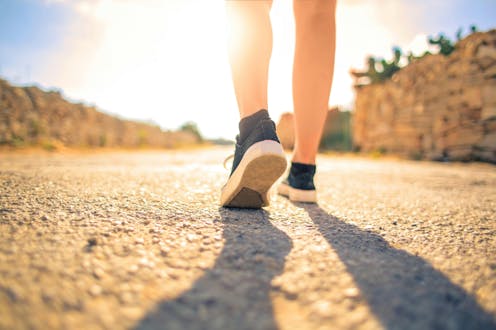Michael Mosley reportedly died from heat exhaustion. How can extreme heat turn deadly?
- Written by Lily Hospers, PhD Candidate in Human Environmental Physiology, Heat and Health Incubator, Faculty of Medicine and Health, University of Sydney

British television host and celebrity doctor Michael Mosley went missing[1] last Wednesday while holidaying on the Greek island of Symi.
Four days later his body was found. The coroner stated Mosley most likely died from natural causes[2]. Greek police say they believe Mosley died around 4pm local time on Wednesday[3], just hours after he had set off on a walk.
The coroner suggested[4] that, given Mosley’s age (67) and the fact he was walking in the sun in a rocky environment, “at some point the body will be exhausted”.
While a full coroner’s report has not yet been finalised, heat has been implicated as a factor that may have contributed to Mosley’s death. Greek police said Mosley is believed to have died of heat exhaustion[5] after losing consciousness while walking in 40°C temperatures.
This tragedy serves as a timely reminder of the dangers of extreme heat.
When do hot conditions become dangerous?
Physical activity levels and conditions in the environment significantly affect our risk of developing heat-related illness.
When we’re doing physical activity, such as walking, the body creates heat as a by-product[6]. The more vigorous the activity, the more heat is generated. If this heat is not lost, the body can experience dangerous and potentially life-threatening increases in core temperature.
The human body has two main ways to lose the heat generated by the body or gained from the environment.
First, the body attempts to lose heat to the surrounding environment by pumping warm blood to the skin surface. However, when air temperatures are higher than skin temperature (around 35°C), this method becomes ineffective. Instead, the body starts gaining heat from its surroundings.
Second, the body can produce sweat, which has a cooling effect when it evaporates. However, in humid conditions, the sweat on our skin evaporates less readily[8], as the air already contains plenty of moisture.
Hot temperatures, sun exposure, humidity and physical activity can all present challenges for the human body. When these factors combine, it can be a recipe for disaster.
How is heat exhaustion different from heat stroke?
Heat exhaustion and heat stroke form part of the continuum of heat-related illness. When heat exhaustion is left untreated it can progress to heat stroke.
Symptoms[9] of heat exhaustion can involve weakness, headaches and nausea.
The more serious progression to heat stroke[10] involves reaching an internal body temperature over 40°C and central nervous system dysfunction. This dysfunction can present as confusion or disorientation, and can cause a person to lose consciousness.
Heat stroke is a medical emergency, where central nervous system dysfunction and organ failure can ultimately lead to death. In one study, 58% of people[11] who developed heat stroke died within one month.
Who is most vulnerable?
People may be more vulnerable to the heat due to physiological or behavioural factors. A combination of both can compound the risk.
Physiological vulnerability to the heat can be complex. A person might have a reduced ability to respond to heat stress, such as a reduced capacity to sweat[12], which is often seen in older adults. Someone may also be more vulnerable because heat worsens their underlying health issues[13], such as heart disease.
People who are unable to respond behaviourally to heat are also at a greater risk. Regulating activity (such as stopping exercise), changing environment (moving into the shade, for example) and adopting cooling strategies (like cooling the skin with a wet cloth) all offer protection.
Someone may not be able to respond appropriately if they don’t sense the need to act, or are unable to regulate activity and their environment. For example, people may be limited in their capacity to regulate risk if they’re carrying out paid manual labour, taking part in sporting events, or don’t have access to shelter or cooling resources.
Underestimating the risks of extreme heat
When the symptoms of heat illness are not responded to quickly, a dangerous cascade of events can occur, which can ultimately lead to death.
Early action is especially important given the symptoms of heat stroke involve confusion and disorientation, which can impair decision-making. A person who is affected by heat stroke may not be well placed to adapt their behaviour, such as by seeking shade.
Be conservative when contemplating going out in hot weather. This includes not underestimating the environmental conditions, but also not overestimating your capacity to handle them.
Importantly, the air temperature reported on a weather forecast is measured in the shade and does not reflect the added power of the sun[15].
5 ways to protect yourself
Plan ahead — avoid activity during the hottest part of the day
If you’re feeling hot and bothered, get out of the heat to a cooler area. This might be indoors or a shaded area outdoors
Stay hydrated by ensuring access to, and drinking, non-alcoholic fluids
Remove or loosen clothing if you are feeling hot and uncomfortable
Attempt to cool down in any way possible. Near a cool body of water? Take a supervised dip. Alternatively, use cold water spray or apply a cool, damp cloth to the skin.
References
- ^ Michael Mosley went missing (www.abc.net.au)
- ^ natural causes (amp.smh.com.au)
- ^ 4pm local time on Wednesday (www.9news.com.au)
- ^ coroner suggested (uk.news.yahoo.com)
- ^ died of heat exhaustion (www.telegraph.co.uk)
- ^ as a by-product (theconversation.com)
- ^ Damianidis Lefteris/EPA (photos.aap.com.au)
- ^ less readily (theconversation.com)
- ^ Symptoms (www.health.nsw.gov.au)
- ^ heat stroke (www.nejm.org)
- ^ 58% of people (jamanetwork.com)
- ^ reduced capacity to sweat (www.health.nsw.gov.au)
- ^ underlying health issues (www.health.nsw.gov.au)
- ^ Oleg Elkov/Shutterstock (shutterstock.com)
- ^ added power of the sun (www.ncbi.nlm.nih.gov)
















